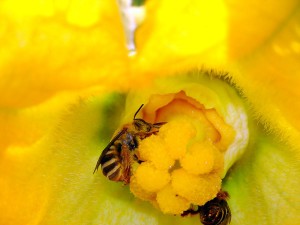Before you buy that ‘bee friendly’ plant, check its source
April 12, 2014
A squash bee collects nectar.
Are your plants bee-ing friendly to pollinators? A recent report states that home gardens may be doing just as much damage to bee populations as large, commercial agricultural outfits.
The study, from Friends of the Earth U.S., Pesticide Action Network, and the Pesticide Research Institute, found that seven out of 13 “bee friendly” plants sold at big-box stores in three large metropolitan areas tested positive for a class of pesticides called neonicotinoids. It’s a type of systemic (absorbed through the roots) pesticide that is deadly to bees, and has, in some studies, been linked to colony collapse disorder.
According to a story from Rodale’s Organic Gardening newsletter, the plants were purchased in the “Washington, D.C., San Francisco, and Minneapolis metropolitan areas” and “included a number of flowers and vegetables popular among home gardeners who want to attract bees and pollinators to their gardens: tomato and summer squash starts, herbs, pumpkins, gaillardia, daisies, zinnias, and asters.”
The Rodale newsletter article suggests that the best way to protect bees is to “go organic.”:
• Seek out USDA- certified-organic seeds and plant starts. They’re prohibited from being treated with pesticides of any sort. And that goes for flowers as well.
• Evict pesticides. Even though the EPA’s new labels will help protect bees, why risk killing any in the first place? The new report lists 55 pesticides sold to consumers that contain active neonicotinoid pesticides toxic to bees. In saving the bees, you’ll be saving yourself: The inactive ingredients in pesticide formulations are often more harmful to human health than the active ingredient.
• Plant wildflowers. Attract and feed wild bees by growing lots of flowering plants from spring though fall, especially native wildflowers, which attract not only bees but also birds and other wildlife that thrive in your local climate.
• Go au natural. Leave a part of your landscape uncultivated. Many native bee species are solitary, rather than social, meaning they don’t build hives. Some nest in the ground, others, in shrubby, weedy areas.
We couldn’t agree more, and we’d like to add one more reason for eliminating the use of pesticides (as well as herbicides and chemical fertilizers): Chemicals eventually end up in the water supply. Tests have found that numerous chemicals used in agriculture are showing up in lakes, streams, rivers, oceans and other bodies of water.
The best way to protect the environment is to work with nature, not independent of it. Eliminating the use of chemicals in our lawns and gardens is a fantastic way to start.
To read the report, click here.